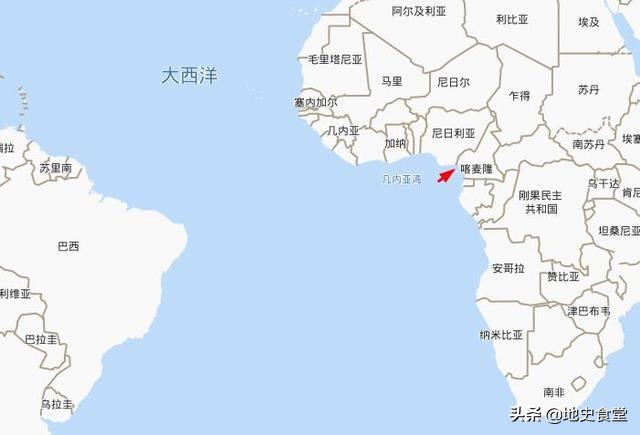Cameroon is located in the central and western regions of Africa, bordering Nigeria, Chad, Central Africa, Equatorial Guinea and other countries, with a total area of about 470,000 square kilometers and a population of about 25 million. Cameroon is bordered by the Gulf of Guinea, a large gulf in Western Africa that is part of the Atlantic Ocean.

There are many countries bordering the Gulf of Guinea, but most of them face the Atlantic Ocean without any restrictions on going to sea, but Cameroon is different. Cameroon has many islands off the coast, the largest of which is called Bioko Island.
With a total area of about 2017 square kilometers and a population of about 210,000, Bioko Island is the largest island off the coast of Cameroon and the entire Gulf of Guinea. Bioko Island is only about 50 km from Cameroon, about 100 km from Nigeria in northern Cameroon and about 160 km from the Munni River region of Equatorial Guinea in southern Cameroon.
Although Bioko Island is very close to Cameroon, the island is part of Equatorial Guinea. Equatorial Guinea covers a total area of about 28,000 square kilometers, and its territory includes the Muni River region on the African continent and the islands of Bioko, Anoben and Korrisco in the Gulf of Guinea.
These islands are located off the coast of Cameroon and are at odds with the Muni River region of the African continent. Among them, Bioko Island is the most important island in Equatorial Guinea, and malabo, the capital of Equatorial Guinea, is located on Bioko Island.
Bioko Island is close to Cameroon but belongs to Equatorial Guinea, which is mainly the result of the colonial era. Cameroon and Equatorial Guinea were german and Spanish colonies, respectively.
Although Germany is also a major European country, compared with Britain and France, Germany has very few colonies, and Cameroon is one of the few german colonies. As an old colonial empire, Spain's main focus is on the Americas, and there are not many colonies in Africa.
When Britain, France and other countries set off a frenzy of partition in Africa, Germany saw the needle and seized the land of Cameroon. Spain also occupied the Muni River region in southern Cameroon. After the German occupation of Cameroon, it gradually realized that the island of Bioko off the coast of Cameroon greatly restricted Cameroon's access to the sea, and German ships entering cameroon's ports needed to pass through the waters near Bioko Island. Therefore, Germany very much wanted to occupy Bioko Island, but at that time Bioko Island was a Portuguese colony, and Germany could not occupy it.
In addition to Germany, Spain, which occupies the Muni River region, also has a crush on Bioko Island, and the location of Bioko Island and the Muni River area are at opposite angles to ensure security.
Portugal is located in the Iberian Peninsula, only Spain has one neighbor, Spain and Portugal are the first countries to carry out colonization activities, the two countries are also relatively close relations. So Spain offered to exchange land with Portugal, and Spain exchanged a piece of land from the Americas for bioco Island.
After Spain acquired bioco island, it formed the colony of Spanish Guinea along with the Muni River region, with its capital at Malabo on bioco island. After the independence of Equatorial Guinea, Bioko Island officially became the territory of Equatorial Guinea, and Equatorial Guinea still chose Malabo as its capital. After Cameroon's independence, it still faced the problem of going to sea during the German rule. Entering the Atlantic Ocean from the north or south, you have to pass through the sea near Equatorial Guinea, which makes Cameroon very helpless.
In particular, in 1991, Equatorial Guinea discovered abundant oil resources in the waters off Bioko Island, relying on oil exports, equatorial Guinea's economy quickly surpassed Cameroon, so for Equatorial Guinea, bioko island is both an economic value and a strategic value.